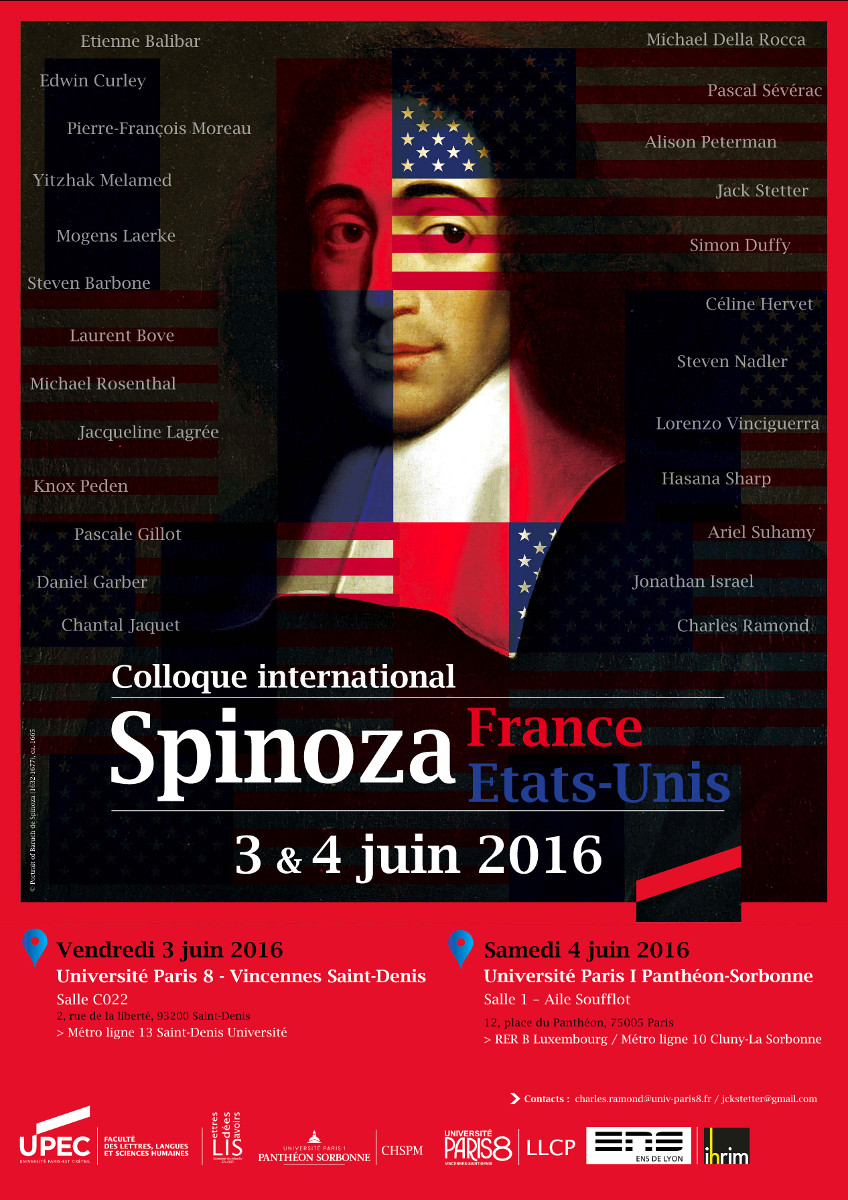Colloque International. Spinoza France États-Unis 3-4.06.2016
Colloque international
Spinoza France États-Unis
3 et 4 juin 2016

Affiche (PDF) | Programme (PDF)
Si la philosophie ignore les nationalités, elle n’ignore pas les langues. Ainsi se créent des traditions d’interprétation qui partagent des références communes, et dont les différences rendent nécessaires les confrontations. Le développement des études spinozistes aux États-Unis, dans les dernières décennies, selon des perspectives historiques, ontologiques, logiques, morales et politiques souvent profondément renouvelées, justifiait l’organisation d’une discussion avec les interprètes français contemporains, héritiers de la tradition spinoziste française. Le Colloque International Spinoza France États-Unis sera le lieu d’une telle rencontre, à la fois amicale et scientifique.
Though philosophy may not know nationalities, it does know languages. It is in this manner that traditions of interpretation are created, traditions that share common references but whose differences make their confrontations necessary. The development of Spinoza research in the United States over the last decades, from often profoundly renovated historical, ontological, logical, moral, and political perspectives, justifies the organization of a discussion with contemporary French interpreters of Spinoza, heirs to the French Spinozist tradition. The International Colloquium Spinoza France États-Unis, will be the site for such a discussion, both friendly and scientific.
Colloque organisé avec le soutien de l’Université Paris 8 Vincennes Saint-Denis, de l’Université Paris 1 Panthéon-Sorbonne, de l’Université Paris-Est Créteil Val de Marne, et de l’École Normale Supérieure de Lyon.
.
Comité scientifique et organisation :
Chantal Jaquet
Pierre-François Moreau
Charles Ramond
Jack Stetter
Pascal Séverac
Date :
Vendredi 3 et Samedi 4 juin 2016.
Lieux :
Université Paris 8 – Vincennes Saint-Denis : Salle C022 – 2, rue de la Liberté, Saint-Denis (93).
Université Paris 1 Panthéon Sorbonne : Salle 1 – Aile Soufflot – 12, place du Panthéon (Paris 5e).
Programme
Vendredi 3 juin
Université Paris 8
09h00 : Accueil des participants. Ouverture.
Danielle TARTAKOWSKY, Présidente de l’Université Paris 8 Vincennes Saint-Denis
Fabienne BRUGÈRE, Directrice de l’EA 4008 LLCP.
.
Session 1
Président : Jonathan ISRAEL
09h30-10h30 : Edwin CURLEY (Emeritus, University of Michigan) : « Spinoza’s Metaphysics Revisited »
Répondant : Pierre-François MOREAU (ENS Lyon)
10h30-10h45 : pause
10h45-11h45 : Yitzhak MELAMED (Johns Hopkins University) : « The First Draft of Spinoza’s Ethics ? »
Répondant : Mogens LAERKE (CNRS).
11h45-12h45 : Steven BARBONE (San Diego State University) : « Individu et communauté chez Alexandre Matheron : héritiers américains d’une lecture française »
Répondant : Laurent BOVE (Université Picardie Jules-Verne)
.
Session 2
Président : Pierre-François MOREAU
14h45-15h45 : Michael ROSENTHAL (University of Washington) : « Spinoza on Beings of Reason [Entia Rationis] and the Analogical Imagination ».
Répondante : Jacqueline LAGRÉE (Université Rennes 1)
15h45-16h45 : Knox PEDEN (Australia National University) : « Perspectives croisées sur l’idée vraie chez Spinoza (Intersecting Perspectives on Spinoza’s ‘True Idea’) »
Répondante : Pascale GILLOT (Université François Rabelais, Tours)
16h45-17h : pause
17h00-18h00 : Daniel GARBER (University of Princeton) : « Spinoza and the Political Uses of Superstition »
Répondante : Chantal JAQUET (Université Paris 1 Panthéon-Sorbonne)
.
Samedi 4 juin
Université Paris 1 Panthéon-Sorbonne .
Session 3
Président : Edwin CURLEY
09h30-10h30 : Michael DELLA ROCCA (University of Yale) : « Strands of Idealism and Realism in Spinoza »
Répondant : Pascal SÉVÉRAC (Université Paris-Est Créteil Val de Marne)
10h30-10h45 : pause
10h45-11h45 : Alison PETERMAN (University of Rochester) : « Spinoza on embodiment »
Répondant : Jack STETTER (Université Paris 8)
11h45-12h45 : Simon DUFFY (Yale-NUS College) : « La transformation des relations dans la métaphysique de Spinoza »
Répondante : Céline HERVET (Université Picardie Jules Verne)
.
Session 4
Président : Etienne BALIBAR
14h45-15h45 : Steven NADLER (University of Wisconsin Madison) : « Spinoza on the Objectivity of Good and Evil ».
Répondant : Lorenzo VINCIGUERRA (Université Picardie Jules Verne)
15h45-16h45 : Hasana SHARP (McGill University, Montréal) : « Spinozan Generosity »
Répondant : Ariel SUHAMY (Collège de France)
16h45-17h00 : Pause
17h00-18h00 : Jonathan ISRAEL (Institute for Advanced Study, Princeton, New Jersey) : « Spinoza’s Formulation of the Radical Enlightenment’s Two Defining Doctrines : How much did he owe to the Dutch Golden Age Political-Theological Context ? »
Répondant : Charles RAMOND (Université Paris8)
.
18h00-19h00 : Discussion finale. Clôture du colloque




